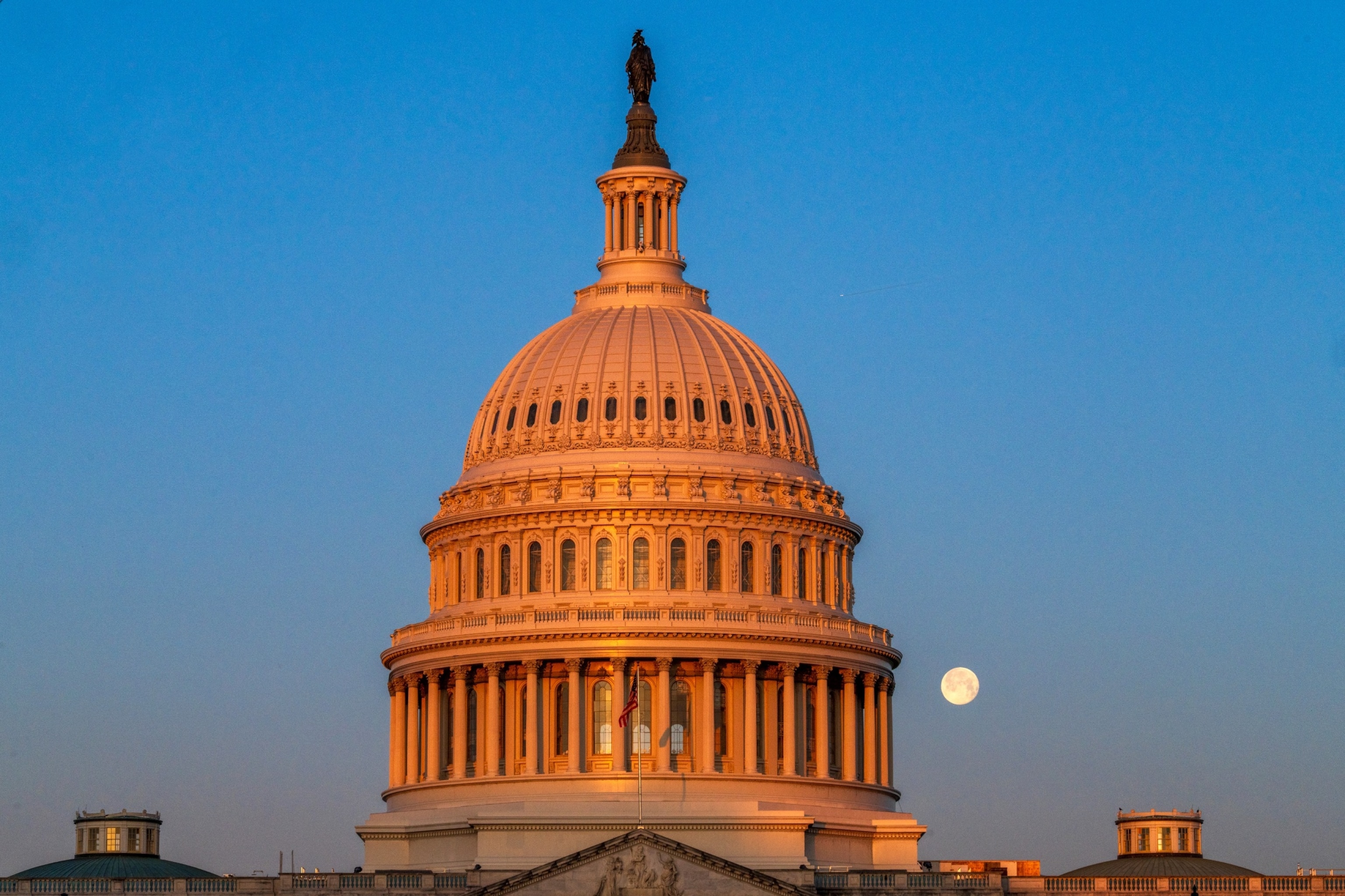Democrats helped Speaker Mike Johnson to pass a short-term funding bill in the House to avert a government shutdown before a Friday deadline — but it only kicks the can down the road for a week.
The House voted 320-99 in bipartisan fashion to approve the short-term continuing resolution, pushing the funding deadlines back slightly to March 8 and March 22.
The measure, brought up under “suspension of the rules,” required a two-third majority vote to pass — which meant Johnson needed Democrats’ votes to pass it. Similar actions by Johnson’s predecessor, Kevin McCarthy put him in hot water and contributed to his ouster last year.
On Thursday, only two Democrats opposed the vote, joining 97 Republicans who voted against it.

Speaker of the House Mike Johnson, Republican of Louisiana, speaks during a news conference after a closed-door House Republican caucus meeting on Capitol Hill in Washington, DC, on February 29, 2024.
Drew Angerer/AFP via Getty Images
The vote marks the fourth time House GOP leaders have put a continuing resolution on the floor since September.
The bill now heads to the Senate. It’s unclear how soon the upper chamber will take up the bill, though it’s expected to pass before Friday night’s funding deadline.
It could face procedural hurdles in the Senate if one member objects to expediting the voting process, potentially pushing a vote past the shutdown deadline.
On Wednesday, House and Senate leaders reached a bipartisan deal to avert the partial government shutdown of roughly 20% of the government, and create new funding deadlines: March 8 for that 20% and March 22 for the remaining 80%.
Johnson hoped that an additional week could give Congress more time to pass all remaining appropriations bills to fully fund the government through the end of FY2024. It comes after Johnson previously promised there would be no more short-term funding bills.

The Snow Moon sets behind the US Capitol Dome on February 25, 2024, in Washington, DC.
J. David Ake/Getty Images
GOP Whip Tom Emmer announced that House votes are canceled for Friday — meaning members will leave town after the funding bill vote.
The House will be back in session next Tuesday.
Senate Majority Leader Chuck Schumer said the Senate may vote as soon as Thursday night on a short-term government funding bill once it clears the House.
“Once the House acts, I hope the Senate can pass the short-term CR as soon as tonight but that will require all of us working together. There’s certainly no reason this should take a very long time. So, let’s cooperate and get it done quickly,” Schumer said on the floor Thursday.
Schumer said collaboration helped lawmakers reach a deal.
“As I said directly to the speaker over and over and over again, the only way to get things done here is with bipartisanship. And this agreement is another proof point,” he said. “This agreement is proof that when the four leaders work together, when bipartisanship is prioritized, when getting things done for the American people takes a high priority, good things can happen even in divided government. And I hope this sets the stage for Congress to finish the appropriations process in a bipartisan way, very soon.”
ABC News’ Sarah Beth Hensley and Jay O’Brien contributed to this report.
In a rare display of bipartisanship, Democrats and the Johnson administration recently worked together to pass a short-term funding bill, avoiding a government shutdown that could have had far-reaching consequences for the country. The bill, which was signed into law just hours before the deadline, provides funding for key government agencies and programs until a more permanent solution can be reached.
The cooperation between Democrats and the Johnson administration is particularly noteworthy given the current political climate, where partisan gridlock often prevents any meaningful progress from being made. However, in this instance, both sides were able to set aside their differences and come together for the greater good of the country.
The need for a short-term funding bill arose due to the failure of Congress to pass a full budget for the fiscal year. Without this funding, many government agencies would have been forced to shut down, leaving thousands of federal employees without pay and disrupting essential services for millions of Americans.
Democrats and the Johnson administration were able to reach a compromise on the funding bill by making concessions on both sides. Democrats agreed to additional funding for border security measures, while the Johnson administration agreed to allocate more resources for healthcare and education programs.
The passage of the short-term funding bill is a temporary solution to a much larger problem. Both Democrats and Republicans acknowledge that a more permanent budget agreement needs to be reached in order to prevent future government shutdowns. However, the cooperation seen in this instance gives hope that bipartisan solutions are still possible in today’s divisive political climate.
Moving forward, it is crucial that both parties continue to work together in good faith to address the pressing issues facing our country. By putting aside partisan differences and focusing on the needs of the American people, Democrats and Republicans can ensure that the government continues to function effectively and serve the best interests of all citizens.



